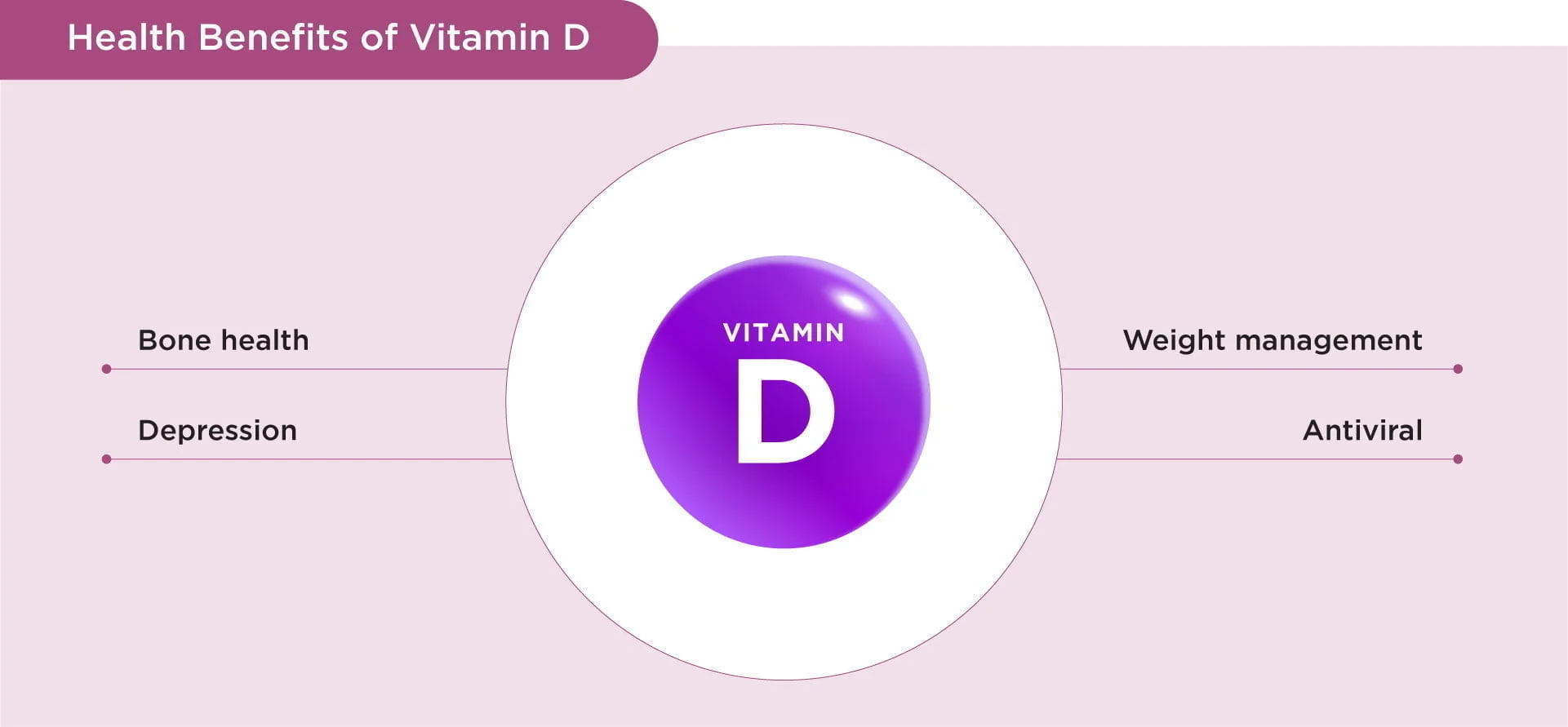Vitamin D

Vitamin D
Vitamin D is also known as a “sunshine vitamin”. It can be synthesized from the exposure of the skin to sunlight between 10 a.m to 3 p.m during all seasons except winter. Vitamin D produced in the skin may last at least twice as long in the blood compared with ingested vitamin D 1. There are two forms of vitamin D which are vitamin D2 (ergocalciferol) and vitamin D3 (cholecalciferol).
Nutritional Facts
UVB light from the sun strikes the skin and contributes about 80% of vitamin D which is converted into vitamin D3 in the body. Unfortunately, some individuals may have limited sun exposure while too much sun exposure possesses the risk of skin cancer. Hence, the alternative way of getting vitamin D3 is through diet and supplements.
For vitamin D2 which is not produced in the human body, it can be obtained from the UV-treated mushrooms and yeast. There are a few foods such as fatty fish that naturally contain a large amount of vitamin D; other food such as eggs and fortified foods can only provide a small amount of vitamin D. Sufficient vitamin D is important to enhance calcium and phosphorus absorption by 30% – 40% and 80% respectively 1.
Published Health Benefits
1. Bone health
Vitamin D plays an important role in maintaining healthy bones. It helps the body to absorb calcium and regulate phosphorus levels in the blood. Vitamin D also increases muscle strength and helps prevent falls 1.
2. Depression
Adequate amount of vitamin D has been found to improve serotonin levels in the central nervous system. Serotonin is an important neurotransmitter that can stabilize mood, feelings of well-being and happiness 2.
3. Weight management
Recent clinical study has shown a high dose vitamin D supplement can significantly reduce body weight, waist circumference, body mass index (BMI) 6. Vitamin D may aid weight loss by altering the storage and formation of fat cells 3.
4. Antiviral
Vitamin D enhances the immune cells to protect the body against pathogens 4. Inadequate intake of vitamin D can increase susceptibility to viral and bacterial respiratory infections 5.
Recommended Daily Dose
The recommended daily amount of vitamin D is at least 600 IU/day for adults, meanwhile for the children and adolescents might need at least 400 – 600 IU/day 5.
References:
1. Nair, R. & Maseeh, A. (2012). Vitamin D: The sunshine vitamin. Journal of Pharmacology and Pharmacotherapeutics, 3 (2): 118-126. https://doi.org/10.4103/0976-500X.95506
2. Patrick, R. P. & Ames, B. N. (2015). Vitamin D and the omega-3 fatty acids control serotonin synthesis and action, part 2: relevance for ADHD, bipolar disorder, schizophrenia and impulsive behavior. The Journal of Federation of American Societies for Experimental Biology, 29 (6): 2207-2222. https://doi.org/10.1096/fj.14-268342
3. Wood R. J. (2008). Vitamin D and adipogenesis: new molecular insights. Nutrition reviews, 66(1), 40–46. https://doi.org/10.1111/j.1753-4887.2007.00004.x
4. Rosa, M. D., Malaguarnera, M., Nicoletti, F. & Malaguarnera, L. (2011). Vitamin D3 : a helpful immuno-modulator. Immunology, 134 (2): 123-139. https://doi.org/10.1111/j.1365-2567.2011.03482.x
5. Hejazi, M. E., Modarresi-Ghazani, F. & Entezari-Maleki, T. A review of vitamin D effects on common respiratory diseases: Asthma, chronic obstructive pulmonary disease and tuberculosis. J Res Pharm Pract, 5 (1): 7-15. https://doi.org/10.4103/2279-042X.176542
6. Khosravi, Z. S., Kafeshani, M., Tavasoli, P., Zadeh, A. H., & Entezari, M. H. (2018). Effect of Vitamin D Supplementation on Weight Loss, Glycemic Indices, and Lipid Profile in Obese and Overweight Women: A Clinical Trial Study. International journal of preventive medicine, 9, 63. https://doi.org/10.4103/ijpvm.IJPVM_329_15









